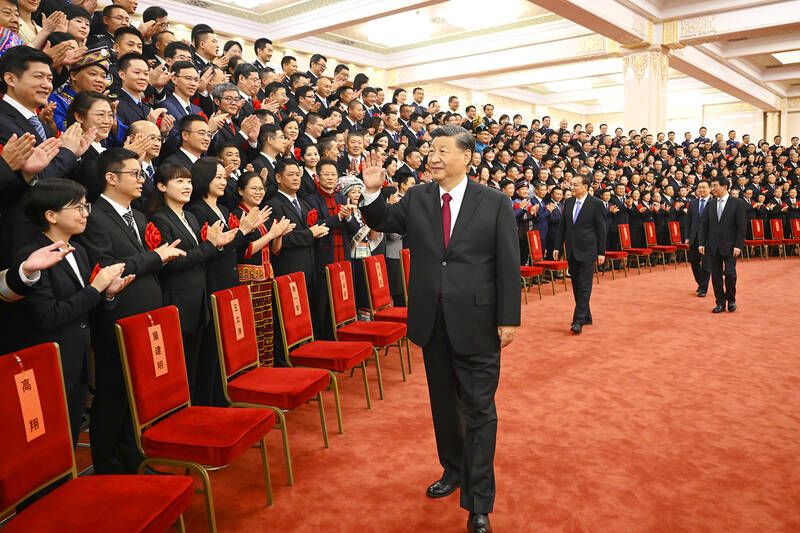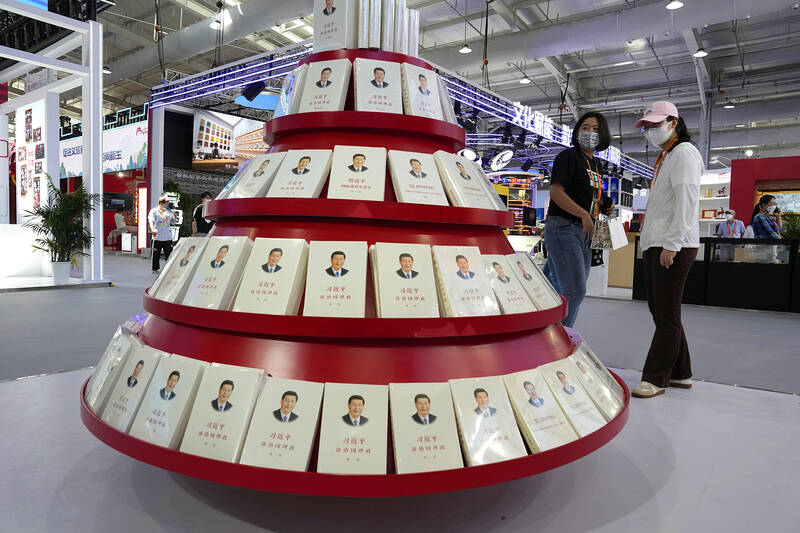Like fearsome dictators throughout history, Xi Jinping (習近平) has a tender side. He loves his mum. In a touching puff piece on Mother’s Day this year, state TV showed China’s strongman president strolling hand in hand with 96-year-old Qi Xin (齊心), a Communist party veteran and proud mother of the paramount leader.
Many mums read fairy stories or sing nursery rhymes to their young children. Not so Qi. She taught five-year-old Xi about Yue Fei (岳飛), a famously hawkish Southern Song dynasty general who had “Serve the country with utmost loyalty” tattooed on his back. This uplifting slogan had inspired his life’s work, Xi claimed.
XI FAILS UPWARD

Photo: AP
Xi’s mum did more than fortify his moral fiber. She also privately lobbied the party hierarchy to advance his lackluster early career. According to Cai Xia (蔡霞), a retired professor of the CCP Central Party School now living in exile, the formidable Qi wrote to Hebei province’s party chief in the 1980s, asking him to give her son a leg up the ladder.
Despite her string-pulling, Xi’s fortunes continued to languish “on account of his middling performance,” Cai noted. But his mum persisted.
“In 1992, after [she] wrote a plea to the new party leader in Fujian… Xi was transferred. At that point, his career took off.”

Photo: AP
Other influential family members also helped Xi overcome his apparent lack of talent.
“He benefited immensely from the connections of his father, Xi Zhongxun (習仲勛), a CCP leader with impeccable revolutionary credentials,” Cai wrote.
Xi’s thus became the classic trajectory of a party princeling, ever failing upwards. A series of senior positions followed, culminating in 2012-13 with the top party, military and government jobs.
Now, having abolished term limits, Xi looks set to be crowned de facto president-for-life at this month’s party congress.
This extraordinary accretion of personal power has already made Xi the most dominant, and most feared, Chinese leader since Mao Zedong (毛澤東). It is all the more unusual because, like Mao, many of Xi’s big policy initiatives have misfired, setting China back and damaging its international standing.
Gone are the restraints of collective leadership as practiced by predecessors Hu Jintao (胡錦濤) and Jiang Zemin (江澤民). Gone too is the commitment to market reforms and openness championed by Deng Xiaoping (鄧小平). And also abandoned is Deng’s guiding principle of China’s steady, peaceful rise.
Xi, instead, is going for broke, forcefully driving China in reverse gear towards the closed, repressive Maoist-era model of centralized state control of administration, business, industry, land and people. Government has become a one-man show.
‘XI JINPING THOUGHT’
Officially approved “Xi Jinping Thought” is, in practice, a recipe for hyper-nationalism, rapid militarization, regional expansionism, discouragement of individualism and the subordination of the private sector, judiciary, civil society, academia and media to the party — and ultimately to Xi himself.
Yet contradicting a pervasive cult of personality, critics paint a very different picture. This portrays Xi as a dangerous, bad-tempered, thin-skinned, dictatorial control freak, more grumpy tyrant than cuddly panda. Such perceptions gave credence to last week’s bogus reports of a coup.
“Behind the scenes, his power is being questioned as never before,” Cai wrote. “Xi’s reversal of economic reforms and his inept response to the COVID-19 pandemic have shattered his image as a hero of everyday people. In the shadows, resentment among CCP elites is rising.”
And it’s exacerbated by Xi’s politically motivated purges of “corrupt” party rivals.
Like other countries, China’s economy faces significant headwinds, yet many of its troubles are of Xi’s making, argued Clark Packard of the Cato Institute. One example was “a debt bubble in the country’s over-inflated real estate sector [that] has led to spectacular crashes,” he wrote.
“Couple recent trends with… slowing productivity growth, demographic decline and a continued brain drain and it becomes clearer that China is not the economic juggernaut many in the west believe it to be.”
Internal weakness is matched by external over-reaching.
“Under Xi, China has embarked on a quest for regional and potentially global primacy… that will lead to increased competition or even confrontation with the US,” warned the leading American analyst, Richard Haass.
Thanks to its threats to Taiwan, suppression of Hong Kong’s democracy, egregious abuses of Uighurs and Tibetans, confrontational “wolf warrior” diplomacy, predatory belt and road investments, and tacit support for Russia’s invasion of Ukraine, Xi’s China is increasingly distrusted and feared around the world.
A survey released last week by the independent Pew Research Center suggested opinion about China in the US and other advanced economies “has turned precipitously more negative” in the past decade. Majorities in most countries expressed “little or no confidence in Xi’s approach to world affairs.”
EXPECT THE WORST
Mutinous mutterings at home, fear and loathing abroad, declining national performance and increasing pushback all round: this is the unpropitious context as Xi grabs the reins as China’s ostensibly unassailable core leader. How will he react?
Cai Xia, who has watched him closely for decades, fears the worst. Xi, she claimed, sees himself as a modern-day emperor. Yet opposing, divided CCP factions currently lack the strength to de-throne him.
“Xi will no doubt see his victory as a mandate to do whatever he wants,” Cai predicted.
“[He] will double down on his statist economic policies. He will continue to preemptively eliminate potential rivals and tighten social control, making China look increasingly like North Korea.”
And if he needs to silence domestic critics by manufacturing an international crisis, “an emboldened Xi may well accelerate his militarization of disputed areas of the South China Sea and try to forcibly take over Taiwan,” she wrote.
The red dawn of Xi’s imperial age comes at a bad time for the world, given all that’s going wrong globally at present — and it raises a worrying, existential question: could anyone possibly be more scary than land-grabbing, nuke-wielding Vladimir Putin?
Answer, yes: an insecure Chinese communist megalomaniac with mummy issue.

This month the government ordered a one-year block of Xiaohongshu (小紅書) or Rednote, a Chinese social media platform with more than 3 million users in Taiwan. The government pointed to widespread fraud activity on the platform, along with cybersecurity failures. Officials said that they had reached out to the company and asked it to change. However, they received no response. The pro-China parties, the Chinese Nationalist Party (KMT) and Taiwan People’s Party (TPP), immediately swung into action, denouncing the ban as an attack on free speech. This “free speech” claim was then echoed by the People’s Republic of China (PRC),

Exceptions to the rule are sometimes revealing. For a brief few years, there was an emerging ideological split between the Democratic Progressive Party (DPP) and Chinese Nationalist Party (KMT) that appeared to be pushing the DPP in a direction that would be considered more liberal, and the KMT more conservative. In the previous column, “The KMT-DPP’s bureaucrat-led developmental state” (Dec. 11, page 12), we examined how Taiwan’s democratic system developed, and how both the two main parties largely accepted a similar consensus on how Taiwan should be run domestically and did not split along the left-right lines more familiar in

As I finally slid into the warm embrace of the hot, clifftop pool, it was a serene moment of reflection. The sound of the river reflected off the cave walls, the white of our camping lights reflected off the dark, shimmering surface of the water, and I reflected on how fortunate I was to be here. After all, the beautiful walk through narrow canyons that had brought us here had been inaccessible for five years — and will be again soon. The day had started at the Huisun Forest Area (惠蓀林場), at the end of Nantou County Route 80, north and east

Specialty sandwiches loaded with the contents of an entire charcuterie board, overflowing with sauces, creams and all manner of creative add-ons, is perhaps one of the biggest global food trends of this year. From London to New York, lines form down the block for mortadella, burrata, pistachio and more stuffed between slices of fresh sourdough, rye or focaccia. To try the trend in Taipei, Munchies Mafia is for sure the spot — could this be the best sandwich in town? Carlos from Spain and Sergio from Mexico opened this spot just seven months ago. The two met working in the